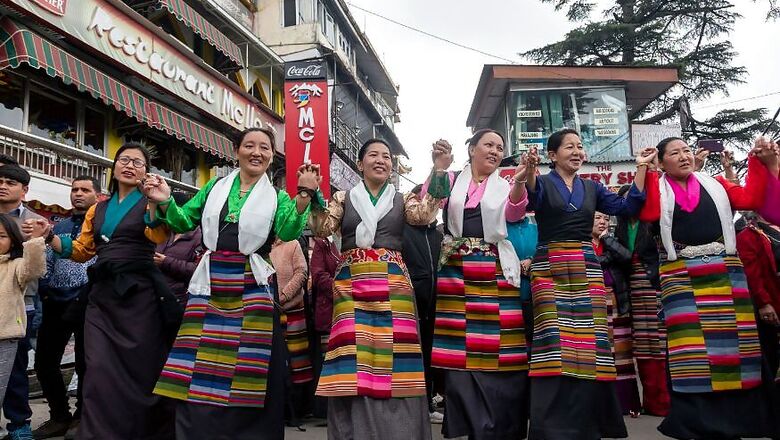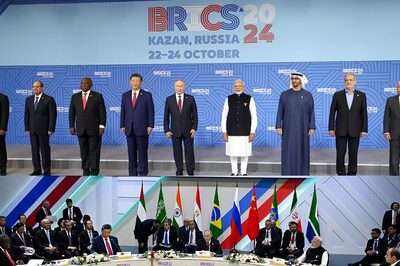
views
Late last month, a United States lawmaker introduced a bill in the Congress to allow the American President to recognise Tibet as an independent nation, separate from China. Tibetan history bears out that it was an independent country till being invaded and annexed by China in 1950. Thomas Laird in his book 'Into Tibet' writes that the plan of invasion was drawn up cleverly by the People's Liberation Army's South-West Military Region, which included Deng Xiaoping among its top three commanders. The United States of America was caught up in Korea. China believed that the United States would not want to open up a second front in Tibet, particularly when thousands of American soldiers were being killed in that war every day.
So, forty thousand Chinese troops crossed the Yangtze river in to Tibet. The Chinese moved with precision and cut off the retreat route of the Tibetan troops back into Central Tibet. A good portion of all of Tibet's forces were encircled without any chance of resupply and radio connect with Lhasa, where the Kashag (governing council) was busy with a picnic.
By October 19 it was all over, and the Tibetan army in Eastern Tibet surrendered to the Chinese at the monastery of Drukha. The Tibetan army was dependent upon the US Central Intelligence Agency's operations to get modern weapons, which arrived too little and too late. They could not stand up to the Chinese army equipped with modern arms, purchased from the US . The news of the Chinese attack reached Lhasa only on the 15th and was withheld from the public for fear of chaos. Distorted accounts of the attack on Tibet were reported in Indian newspapers on October 12 but they were denounced by the-then government for days as false rumours. The New York Times reported the Chinese invasion only on October 14.
Thomas Laird writes further that the invasion revealed lack of support from India, Great Britain and even the United States. China had warned the Tibetans in 1950 not to listen to the imperialists. China offered a grand post-colonial alliance if Indians did not help Tibetans. Britain was worried that if it helped Tibet, China would challenge its colonial claims to Hong Kong. Chiang Kai-shek neutralised America, giving the Chinese a free hand to invade Tibet without paying any price. A faction within the CIA, that opposed America's covert involvement in Tibet between 1949 and 1972, believed that stable Sino-American relationship was worth any price including Tibet. India was considered to be a not-so-friendly country having inclinations towards the USSR.
Nations of the world hoped that Tibet and China would negotiate a respectful settlement. India assured all that this would happen. By 1952, 90 per cent of the food that the Chinese army needed to remain in Tibet was shipped through India. Once established in Tibet, China invaded India in 1962, leaving the latter surprised.
The Dalai Lama had no choice but to send a team to negotiate with China. The Chinese promptly told the Tibetans that they must accept all Chinese terms, otherwise the invasion would resume. Under duress, Tibetans allowed the Chinese to forge government seals that the Dalai Lama had used. Tibet did not remain in anyone's interests. It was prevented from joining the United Nations: when tiny El Salvador brought up the question of Tibet to the UN in 1951, the US joined the USSR in voting to postpone any debate.
In 1950, there were no Chinese in Tibet. Today, the Chinese are in majority even in small Tibetan towns. Communist Party general secretary Jiang Zemin told President Bill Clinton in 1998 that very few Chinese, who were in Tibet, were there only to help the Tibetans and would, of course, all eventually return to China. A 17-point agreement was signed between Tibetans and the Chinese government. The PLA entered Tibet. As per the agreement, the force was obliged to protect the lives and property of all religious bodies and people of Tibet. China violated every one of those promises. About 90-95 per cent of Tibetan temples were razed during the cultural revolution.
Whatever may be the compulsion or illusion, our leaders of that time made a blunder in not objecting to this dragon settling in our neighbourhood and that too permanently. Not only this, they kept on surrendering before this cunning neighbour. Perhaps one blow was not enough for us to learn a lesson. Our government declared easily that Tibet is an integral part of China. They advocated for a permanent seat in the UN Security Council for China, while the US was interested to offer that privilege to a democratic India and not a communist China. India helped China in becoming member of the World Trade Organization, particularly when several strong countries were not in favour. On the other hand, China left no occasion to stab India in the back. Be it a matter related to dispute between India and Pakistan about Jammu and Kashmir or declaring a dreaded terrorist Masood Azhar as an international criminal, China not only opposed India but remained at the forefront to humiliate it. China has refused to recognise the international boundary between India and Tibet and intrudes in our territory very often. It has developed a habit of keeping us under threat unless we toe its line in world forums. China's tricks to get support by threat yielded desired results in the past. Perhaps pursuing the same modus operandi, it intrudes and claims ownership of our territory, taking benefit of uncertainty over the border at several places.
India gave shelter to millions of Tibetan refugees. Instead of supporting their cause, the Indian government suppressed their efforts in reclaiming their independence from China. They are residing here, consuming our hard-earned resources. During this span of more than 60 years, their population would have increased manifold. A majority of them are born in India; they now claim Indian citizenship. May be peace-loving by nature, but the Tibetans are draining our natural resources. Their return to Tibet may create lakhs of jobs for our youths. It is high time that we should persuade them to return to their own country and claim their rights from China.




















Comments
0 comment